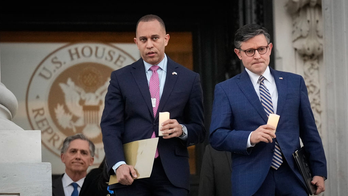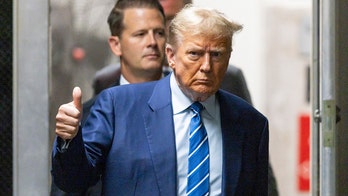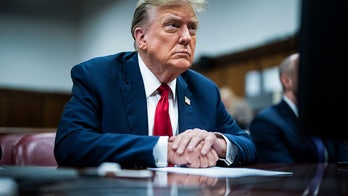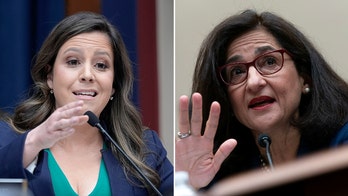When Leon Panetta goes before the Senate Intelligence Committee for his confirmation hearing, the questions will be more about his boss and his policies than about Panetta himself.
President Obama recently delighted some supporters by throwing out key provisions of the Bush war on terrorism -- partly a symbolic move meant to demonstrate a clean break with the past. Unfortunately, Obama emphasized what he was rejecting more than what he plans to put in its place, leaving serious questions among lawmakers of all political stripes.
In fact, Obama seems to have many unanswered questions of his own, since he created task forces and gave each 180 days to examine his executive orders, one on Guantanamo Bay and one on interrogation methods, and determine whether his pronouncements will make workable policy.
He apparently suspects they may not because, in each case, he left himself back doors that would allow him to do the opposite of what his public statements seem to proclaim.
First, on Guantanamo Bay, the new president didn't close Gitmo -- he just renewed what he'd been saying for months, that he intends to close it within a year. The Bush administration also tried, but couldn’t resolve questions Obama now faces: What do we do with the detainees there if they can't be tried and no other nation will take them?
Nor did President Obama pledge to stop holding terrorist detainees, even without charges. He only said that whomever we continue to hold will be held some place other than Gitmo.
Does that mean bringing them to the United States? And if so, would detainees be treated like criminal defendants with all the attendant rights or like illegal combatants and held in a manner similar to POWs?
And if the president is establishing the principle that the U.S. military will not be allowed to hold prisoners without charges, what happens to the facility at Bagram Air Base in Afghanistan, where we are holding almost three times as many prisoners as we are at Guantanamo Bay, a population that is growing. The conditions at Guantanamo after all these years are clearly better than at Bagram, but there is not a word about closing it down or disposing of the prisoners. Is the President against holding prisoners without charges everywhere? Or just in places that make headlines?
The president's executive order on interrogations leaves even more troubling questions. Obama ordered that terrorists be questioned only using methods in the Army Field Manual, which are aimed at uniformed POWs captured in a war, not hardened terrorists targeting civilians. No one disputes there are many legal methods far short of torture but well beyond the field manual, but the president has declared additional interrogation methods out of bounds.
One intelligence source says: "If the American people only knew what they were, there would be overwhelming support to use them."
In addition, it is widely believed that additional methods are needed because Al Qaeda is known to train its terrorists to the army field manual so those captured know what to expect and how to withstand it.
As a result, this executive order raises a key question which could determine the future of his presidency. What happens if the U.S. captures someone like Khalid Sheikh Mohammed, the architect of 9/11, who has knowledge of intended attacks? When he is asked if he has any knowledge of planned attacks and he says something to the effect of "you'll know soon enough," what does the CIA do?
Obama seemed to acknowledge the limits of his own policy in several ways, first by asking a task force to determine within 180 days whether there should be a separate interrogation standard for the intelligence community.
In addition, in his remarks after signing the orders, he seemed to anticipate his policy could be short-lived, as he explained that the order "effectively ensures that anybody who is detained by the United States for now (italics added) is going to be, um, any interrogations taking place are going to have to abide by the Army field manual."
And then the White House added an even broader loophole. The order says flatly that the Army Field Manual will be the only guide for interrogation -- "unless the attorney general with appropriate consultation provides further guidance..."
Isn't that what the Bush Administration did with Abu Zubaydah, the first major Al Qaeda figure it captured after 9/11? When polite methods crafted for uniformed POWs failed because he had been trained to resist them, the CIA turned to President Bush and the attorney general and asked what else they could do. That is a path President Obama has roundly condemned but now seems to contemplate for his own administration.
The new president has continued the policy of targeting terrorists in the border regions of Pakistan by allowing Predator strikes to continue. So, does Obama have no compunction about killing alleged terrorists, and perhaps their families, from a high altitude, but is squeamish about coercive interrogation or capturing them and sending them back to their home nations?
Senators will be looking for clues from Leon Panetta, who in all likelihood, will soon be managing these policies.
It is understandable that Obama would review every policy of the Bush years, but many in the intelligence community are uncertain where the new president is headed.
The back doors he tucked into his executive orders suggest Obama has some nagging sense that even though his pronouncements are politically popular, they might also be dangerous for the country and his presidency.
Should such moves be seen as an encouraging flexibility? Are they a sign that he has reservations about his own policy statements and maintains an open mind about on whether alternatives may be needed. Or is it a sign, as some suspect, of a troubling uncertainty on the part of a new President?
Obama enjoys enormous public support, but he seems to understand that the public would turn on him in a minute if there were another terrorist attack and it turned out he had passed up clearly legal ways to interrogate a captured terrorist and possibly gain intelligence to prevent it. In that case, his presidency would be permanently tarnished. For a new president with so many ambitions, an attack under those circumstances would be a calamity not only for the country but also for him.
Jim Angle is chief Washington correspondent for FOX News.




